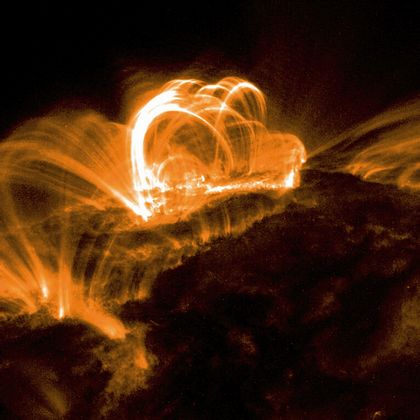“Once this source of energy is mastered, it will literally change our vision of energy.” Professor Minh Quang Tran, director of the Plasma Physics Research Center (CRPP) at the EPFL and in charge of the EFDA (The European Fusion Development Agreement) is convinced nuclear fusion is the energy resource of the future. At work in the sun and in several other stars of the universe, fusion is a process by which two atomic nuclei combine together to form a heavier atom, thus freeing a tremendous amount of energy. The supposed advantages of fusion are numerous: clearly less dangerous than nuclear fission, fusion would theoretically produce far more energy, with an equal mass of “fuel”, than present day nuclear reactors, while creating no or little longlife nuclear waste.
But practical industrial application must still be achieved. To this end, the Soviet Union, which for many years pursued this technology with its Tokamak reactors, in November 1985, suggested setting up an international development program.
Twenty years later, countries from all over the World, including Russia, the United States, Japan, China, India, and the European Union began building in Cadarache, France the first experimental reactor using nuclear fusion.
Named ITER (International Thermonuclear Experimental Reactor), this project, which will have an estimated cost of 10.3 billion Euros over 30 years, aims to demonstrate the feasibility of using nuclear fusion. «In my view, it is wonderful that scientists from the whole world are sharing their knowledge in order to succeed in such a project», says Minh Quang Tran. But this cooperation is not selfless. “The internationalisation of this type of research is necessary, as countries no longer have the means to undertake these experiments alone,” explains Olga Kodolova, a scientist from Moscow’s Institute of Nuclear Physics, which is participating in another huge international program, at CERN.
If the results are conclusive, ITER would be followed by the construction of a demonstration reactor. However, this second step is unlikely to bring the countries together. On the contrary.
“The different partners are all thinking of undertaking independent studies in order to build a demonstration reactor,” notes Professor Minh Quang Tran.
“A cooperative alliance might be formed, but it’s very improbable…” Thus, Russia has just announced that it will put 20 billion dollars on the table, between 2015 and 2050, to develop nuclear fusion commercially. After the construction of ITER, “every country must take individual responsibility for the commercial development of this energy,” explained Yevgeny Velikhov, a Russian academic and former President of the ITER Council, to the RIA Novosti press agency. For Minh Quang Tran, “this evolution is natural.
As long as there is no commercial implementation, countries share their knowledge. But the closer one gets to the goal, the more complicated it becomes. Today, countries are already thinking of working alone. In my view, that’s the sign of success.”













